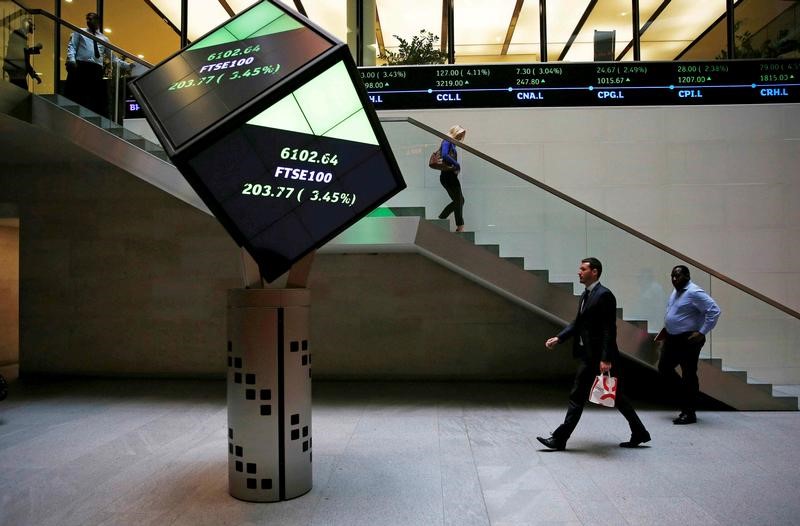By Kate Holton and Vikram Subhedar
LONDON (Reuters) - Major companies listed in London overcame the shock of Brexit to report robust third quarter trading, with strong performances from multi-national firms helping to offset domestic pressure and lift overall forecasts.
The pound's collapse helped drive foreign earnings at miners, pharmaceuticals and industrial groups, prompting analysts to revise up their earnings expectations from a prior six-month basis for the first time in more than five years.
Conversely, sterling's slide weighed on companies focused purely on Britain, while firms relying on business investment are also starting to show the strain.
"The impact of Brexit on third quarter financial results at FTSE firms has been fairly muted," Richard Marwood, Manager of the Royal London UK Growth Fund, said.
"The companies who have reported a material impact have put this down to movements in currency markets, much of which is also being reflected in current share valuations."
Britain's June 23 vote to leave the world's biggest trading bloc shook financial markets and sent sterling plunging to levels last seen in 1985.
But despite business bosses issuing cautious outlooks, Thomson Reuters data shows that analysts have revised up earnings forecasts for the FTSE 350, helped also by a resurgent banking sector benefiting from loan demand and bond trading.
According to brokerage Market Securities, 70 UK quoted companies on the FTSE All Share warned on profits in the third quarter, nine fewer than the same period a year ago. A third of those firms cited Brexit as a contributing factor.
Companies particularly struggling include airlines, while those firms that rely on business investment have also been hit. Outsourcers are reporting client delays and indecision, media companies have reported a drop in corporate advertising spend and commercial property sales have stalled.
General retailers operating just in Britain have also struggled on fears that inflation will start to rise, hitting profit margins or sales in the future.
"Sterling weakness is going to be a big benefit in terms of a translation impact," said Alastair George, chief strategist at Edison Investment Research. "But it's going to make life a little bit more difficult for the retailers.
"With Brexit, there was something of an over reaction in the early days … but there's a risk of underestimating the impact in the medium term."
POSITIVE SURPRISE
Looking at 189 companies where Thomson Reuters had forecasts and excluding energy stocks that are affected by the price of oil, third-quarter earnings produced a 3.1 percent positive surprise according to I/B/E/S data.
As a result, analysts revised up their next 12-month expectations. For the FTSE 350, earnings per share expectations are 1.8 percent higher than they were six months ago, the first time they have risen since July 2011. http://reut.rs/2gkmMU5
MINERS, PHARMA AND INDUSTRIALS
The FTSE 350 was boosted in third-quarter results by miners, pharma companies and industrial groups which all reported a lift from the strength of their foreign earnings.
Miners take the top five slots in the list of best share performers over the last six months - with Glencore (L:GLEN) and Anglo American (L:AAL) more than doubling on the strength of foreign earnings and a rebound in commodity prices.
The FTSE All Share Mining Index is up 68 percent in six months, Pharma and Biotech is up 5 percent, Aerospace and Defence is up 18 percent and General Industrials up 15 percent.
GlaxoSmithKline (L:GSK) generates more than 95 percent of sales outside Britain from a cost-base in pounds and beat sales and profit expectations due to currency moves. It now expects a 21 percent increase in full-year earnings per share.
AIRLINES
Airlines have been the worst hit sector, exposed to currency moves, fluctuations in consumer confidence, overcapacity in the short-haul European market plus attacks in Europe and strikes.
According to Reuters data, analysts downgraded EPS forecasts by 34.4 percent as groups including easyJet (L:EZJ) and British Airlines-owner IAG (L:ICAG) warned on profits and saw their shares fall 32, 19 and 14 percent respectively over the last six months.
OUTSOURCING
The Support Services sector has been hit hard in the last two months, with delays in customer decision-making forcing Mitie (L:MTO) and Capita (L:CPI) to warn on profits.
Earnings were initially revised higher in the months after the vote but that changed when Mitie, which provides everything from pest control to property cleaning and healthcare services, warned that clients were deferring decisions.
The FTSE 350 Support Services index is down 1 percent in the last six months but down 7 percent in the last quarter.
HOUSING/COMMERCIAL PROPERTY
Britain's 900 billion pound ($1.1 trillion) commercial property market was one of the first sectors to be hit.
Great Portland Estate (L:GPOR) and Derwent London (L:DLN) cut their forecasts for rental income, while residential property agents such as Foxtons (L:FOXT) and Countrywide (L:CWD) downgraded earnings.
The 350 FTSE Real Estate Index is down 15 percent in the last six months (FTNMX8630).
MEDIA COMPANIES/ADVERTISING
Newspaper advertising revenue has been tumbling as big brands moved ads online, but in November the country's biggest commercial broadcaster ITV (L:ITV) said companies were holding back from spending on TV too.
ITV said it expected advertising on its TV channels to fall 7 percent in the run-up to Christmas because companies have become less confident since Brexit.

Sky (L:SKYB), Britain's biggest pay-TV company, said advertising fell 3 percent in its most recent quarter. The FTSE All Share Media index is down 1.8 percent in the last six months but down 7 percent in the last 3 months.